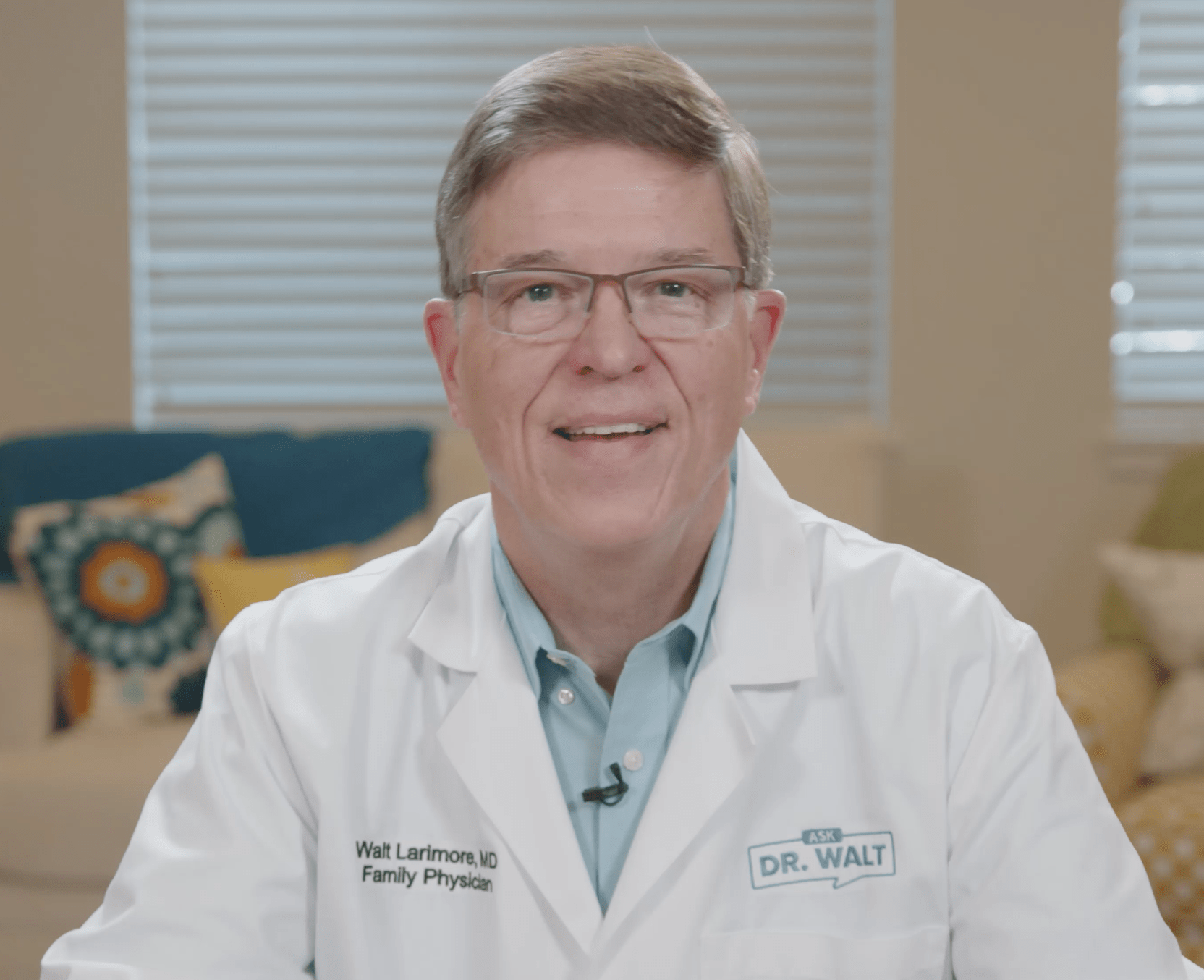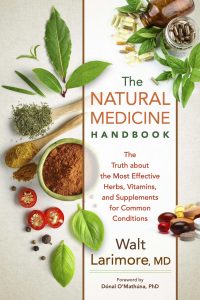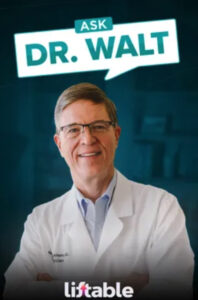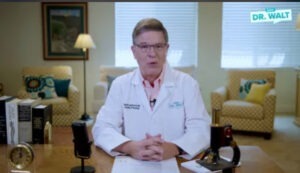
Apple a Day 001 – The Nordic Diet
September 8, 2023
A Voice from the Past Provides an Overwhelming Blessing
September 13, 2023People increasingly understand there are no medical cures for dementia or Alzheimer’s. No wonder more than one-third of all adults and over 80 percent of older adults take expensive supplements to help ward off memory decline. But what if anything works and what doesn’t? I’ll tell you on today’s episode of Ask Dr. Walt.
From 2021-2022, I was honored to host a TV show on LiftableTV, “Ask Dr. Walt.” In this two-part series, I’m be explaining how to protect and promote the health of your brain while dramatically reducing your risk of dementia and Alzheimer’s on today’s episode of Ask Dr. Walt: Brain Health—Part Two
You can click below to watch a video of the show, or I’ve put the show transcript at the end of the blog if you’d prefer.
To learn more about brain health and reducing your risk of dementia or Alzheimer’s, consider picking up a copy of one of my best-selling books which has two chapters on the topic—The Natural Medicines Handbook: The Truth about the Most Effective Herbs, Vitamins, and Supplements for Common Conditions. You can find it at DrWalt.com. Just click on the tab that says books or click below.
Disclaimer: The Ask Dr. Walt show is designed for entertainment purposes to give information on various medical conditions, treatments, and procedures for your personal knowledge and to help you be a more informed consumer of medical and health services.
SHOW TRANSCRIPT
TEASE:
Surveys show that six times as many people are more fearful of developing dementia or Alzheimer’s than they are of cancer or heart disease. On top of that, people increasingly understand there are no medical cures for dementia or Alzheimer’s. No wonder more than one-third of all adults and over 80 percent of older adults take expensive supplements to help ward off memory decline. But what if anything works and what doesn’t? I’ll tell you on today’s episode of Ask Dr. Walt.
OPEN:
Hi, everyone. I’m family physician Dr. Walt Larimore. Thanks for joining me today for a very important discussion. In our last program we talked about the steps you could take to prevent or significantly delay age-related memory loss, dementia, or Alzheimer’s—including proven nutritional, exercise, and mental steps we all should take.
But first, a quick review. There is a spectrum from normal age-related memory loss to dementia. Dementia is an overarching term for a family of progressive brain diseases that slowly destroys memory and thinking skills. Alzheimer’s disease is both the most severe and the most common form of dementia. Alzheimer’s has no known cure and by itself is 100 percent fatal.
Because people are so fearful about dementia and Alzheimer’s, more and more consumers are buying into the hype surrounding natural medicines, that’s herbs, vitamins, and supplements, to either prevent or treat brain decline or to improve brain health. AARP estimates that the sales of supplements claiming to boost memory will be an estimated $5.8 billion by 2023. Unfortunately, as you’ll learn in this show, almost all of these concerned and fearful people are wasting their money.
1) Our first question is from Amos in West Valley City, Utah: You said that the AARP is against all supplements for brain health. Why is that?
Amos, AARP was so concerned about this issue that they formed the Global Council on Brain Health or the GCBH, an independent collaborative of scientists, health professionals, scholars, and policy experts from around the world who are working in areas of brain health related to human cognition. In an exhaustive report, these international experts advised this: “We do not endorse any ingredient, product, or supplement formulation specifically for brain health unless your health care provider has identified that you have a specific nutrient deficiency.”[i] The report analyzed every single existing study on supplements claiming to boost cognition—from fish oil to jellyfish, vitamins to minerals, and gobs of herbs. AARP and the GCBH concluded: “We do not recommend any dietary supplement for brain health.”[ii] So, the AARP’s recommendation was based upon the best science available. Let’s look at some specifics.
2) Sandra in Greensboro, North Carolina, has a challenge for me. She writes, “Are any other scientists concerned about supplements to prevent or treat dementia?”
Too many to name in this short program but let me give you a couple of examples. First you need to know about Cochrane. It’s a global independent network of researchers and professionals. Many are world leaders in their fields. They work together to produce credible, accessible health information that is free from commercial sponsorship and other conflicts of interest.[iii] They have published a review of every study evaluating vitamin or mineral supplements for preventing dementia or delaying mild cognitive impairment, also called “MCI.” They concluded, “It is not possible to identify any supplements which can reduce the risk of people with MCI developing dementia or which can effectively treat their symptoms.”[iv]
In our last program, I mentioned Alzforum, a news website and information resource dedicated to researchers of dementia and Alzheimer’s disease. Alzforum says, “Researchers believe such supplements offer false hope while shrinking the wallets of people worried about cognitive decline and dementia.”[v] In fact, every neuroscientist contacted by Alzforum “universally believe[s] brain health supplements are ineffective.”[vi]Mayo Clinic neurologist David S. Knopman, MD, a researcher in dementia and Alzheimer’s, agrees, saying, “There is zero evidence from any reasonably rigorous study that any supplement or dietary aid has any benefit on cognitive function or decline in late life.”[vii]
2) Next up is Miguel in Cleveland, Tennessee: My doctor says antioxidants like beta-carotene, vitamin C, and vitamin E are all great for brain health. Do you not agree?”
Rather than give you another opinion, Miguel, let’s look at the evidence. A Cochrane paper on antioxidants concludes, “The results are mixed, but the review authors say that long-term supplementation with antioxidant vitamins may be the most promising area for future research.”[viii]
Another group I trust is called Natural Medicines. It’s a large group of independent doctors of pharmacology who study the safety and effectiveness of herbs, vitamins and supplements.
They rate Beta-carotene as “Possibly Ineffective” for dementia and Alzheimer’s and as having “Insufficient Evidence” for cognitive performance. Furthermore, it is “Possibly Unsafe” in smokers.
Vitamin C and Vitamin E are classified by Natural Medicines as “Likely Safe” but as having “Insufficient Evidence” for preventing or treating dementia or Alzheimer’s, while Vitamin E is rated by Natural Medicines as “Likely Safe” and “Possibly Effective” in treating but not preventing AD. Furthermore, vitamin E is “Possibly Unsafe” when used doses exceeding 1000 mg daily as it is associated with significant side effects. In addition, vitamin E in doses above 400 IU/day has been linked with increased mortality.[ix]
3) Julia from Pittsfield, Massachusetts, writes, “Age-related memory loss and dementia runs in my family. I read in a magazine that B vitamins are my best bet to prevent the problem. True or false? And, what doses should I take?”
In another review, Cochrane advised, “B vitamins have not fared any better.” They found that supplementation with B6 (pyridoxine), B9 (folic acid), or B12 (cobalamin), whether combined together or taken individually, “failed to slow or reduce the risk of cognitive decline in healthy older adults and did not improve brain function in those with cognitive decline or dementia.”[x] In a more recent update, Cochrane added that of all vitamins, “Only B vitamins have been assessed in more than one RCT [randomized controlled trial]. There is no evidence for beneficial effects on cognition of supplementation with B vitamins for six to 24 months.”[xi]
Let’s see what the experts at Natural Medicines have to say. They rate Vitamin B6 (pyridoxine) as “Possibly Ineffective” for age-related cognitive decline and to prevent or treat Alzheimer’s. They rate Vitamin B9 (folic acid) as having “Insufficient Evidence” to prevent or treat Alzheimer’s and as “Possibly Ineffective” alone or in combination with other B vitamins in preventing or treating age-related cognitive decline. Finally, the rate Vitamin B12 (cobalamin) as having “Insufficient Evidence” for preventing or treating dementia or Alzheimer’s and also as “Possibly Ineffective” in improving cognition in young or elderly adults.
Despite these ratings, taking vitamin B12 with folic acid is rated by Natural Medicines as “Effective” in treating any memory loss associated with a documented deficiency in either. Unfortunately, they do not prevent memory loss.
4) Earl from my and Barb’s hometown of Baton Rouge, Louisiana, asks, “I’ve heard that fish oil is great for brain health. I’ve been taking it for years. Please tell me I haven’t wasted my money!”
Earl, to mix it up, let’s look at a review from a very trusted source, Consumer Reports. In their review they wrote, “Some studies have found that people with diets high in omega-3s—which are found in fatty fish such as salmon—may have a lower risk of dementia. But similar benefits are not linked to supplements. A review of data on thousands of older adults found that those who took omega-3 fatty acid supplements had no fewer dementia diagnoses or better scores on tests of short-term memory than those who took a placebo.”[xii]
Natural Medicines says, “Most clinical research shows that fish oil supplementation does not improve cognitive function in healthy adults, healthy elderly individuals, or elderly patients with self-reported cognitive decline.”
5) Felicia from Birmingham, Alabama, comments, “I think ginkgo is helping my memory, so what’s the harm?”
Ginkgo is one of the most used natural medicines to boost cognitive function, even among college and professional school students. It’s also used to improve symptoms of Alzheimer’s disease or dementia. However, the experts at Natural Medicines tell us, “Ginkgo does not appear to benefit age-related cognitive decline.” They add, “Most research shows that ginkgo does not improve memory or attention in elderly individuals. Don’t recommend it.”
Natural Medicines doctors also warn, “Numerous case reports have documented serious bleeding events in patients taking ginkgo, especially when taken with aspirin, blood thinners, or antiplatelet drugs.” To make matters worse, they caution us that, “Ginkgo products produced by lower-quality manufacturers are commonly adulterated” and remember that “herbal combination products, particularly those manufactured overseas, are frequently tainted with drugs and heavy metals.”
6) Gary from Rancho Cucamonga, California, simply asks, “What about vitamin D? I’ve heard people with low levels of vitamin D are more likely to have worse cognitive skills and more rapid cognitive decline.”
Gary, Natural Medicines writes, “Population research has found that low vitamin D levels are associated with worse cognitive performance and cognitive decline compared to high vitamin D levels in healthy adults. However, there is no evidence that vitamin D supplementation improves cognitive function. Additional trials are needed to determine if dietary or supplemental vitamin D improves cognitive function.”
However, ConsumerLab.com adds this important caveat, “Supplementing with vitamin D may modestly improve cognition in older individuals with mild cognitive impairment who are vitamin D deficient, but it will not boost cognitive performance in adults who are not cognitively impaired or who have normal vitamin D levels.”
7) Terry from Ocala, Florida, says, “I’m seeing a naturopath who has me on zinc, copper, citicoline, and coconut oil supplements for brain health. He says that they work great in his patients.”
The experts, it seems to me, disagree with your provider. For example, Cochrane advises, “Moderate-certainty evidence suggests that zinc or copper supplementation has little or no effect on overall cognitive function, or the incidence of cognitive impairment, after five to ten years.”[xiii] Natural Medicines agrees that for the prevention or treatment of dementia or Alzheimer’s zinc has “Insufficient Evidence” while copper is “Possibly Ineffective.”
As far as acetyl-L-carnitine, citicoline, coconut oil, phosphatidylserine, or resveratrol, they have been researched but the results are highly inconsistent. As a result, Natural Medicines’ experts conclude that although each may be “promising, it is too early to recommend [them] for preventing age-related memory loss.” Of this assortment of possibilities, Natural Medicines writes, “Although acetyl-L-carnitine looks the most promising, it is too early to recommend it for slowing age-related cognitive decline. Also, be aware that acetyl-L-carnitine may interact with some drugs commonly used by older patients.”
8) Irene in Amarillo, Texas, tells us, “My elderly grandmother’s doctor is having her take selenium for her dementia. I’m not seeing any changes. In fact, I think she may be getting worse.”
Irene, Cochrane concludes that “Selenium alone, taken for around five years, has no effect on the incidence of dementia or Alzheimer’s.”[xiv] Natural Medicines rates it as having “Insufficient Evidence” for preventing dementia or Alzheimer’s. ConsumerLab points to a major, placebo-controlled study among men in the U.S. that found high-dose selenium and vitamin E did not reduce the risk of developing dementia over a thirteen-year period but was associated with a significant increase in hair loss and dermatitis.
9) Terry from Ocala, Florida, asks, “What about huperzine A?”
Well, huperzine is interesting. It’s a herb isolated from Chinese club moss. Natural Medicines writes, “Taking huperzine A orally seems to improve memory, cognitive function, and behavioral function when taken for up to thirty-six weeks [but only] in patients with Alzheimer disease. Mood and activities of daily living also seem to improve with use of huperzine A in some of these patients.” However, they conclude that “further research is needed in these patients.”
ConsumerLab points out, “Some studies suggest huperzine A may enhance the effects of prescription drugs [for mild to moderate Alzheimer’s] permitting lower doses of these drugs and fewer side effects from them.” However, ConsumerLab warns, “Be aware that supplements that list huperzine A may contain more or less huperzine A than claimed on the label, and/or potentially dangerous unlisted ingredients.” In fact, ConsumerLab “Approved” only half of the products they tested. Another analysis from the Uniformed Services University and the National Center for Natural Products Research evaluated twenty-two huperzine A supplements sold in the U.S, finding only two of the products contained within ten percent of the amount of huperzine A listed on their labels. Even worse, 73 percent of the products contained ingredients not listed on the label, and 41 percent listed ingredients not meeting the regulations for being a dietary supplement ingredient, according to the FDA. The researchers warned, “Some ingredients not on the label could be dangerous.”[xv]
I think I only have time for one more question, but it’s a doozie.
10) Drew from Longmont, Colorado, wonders, “What about all the products that contain combinations of supplements for brain health? They all seem very expensive. Do any of them work?”
Drew, an almost endless array of these combination products is hyped for brain health. They include a wide variety of combinations of natural medicines, including B vitamins, antioxidant vitamins, dietary supplements, herbal products, fruit juices and extracts, and minerals. According to the experts at Cochrane, all studied products “have little or no effect on cognitive function.” Cochrane adds, “We did not find evidence that any vitamin or mineral supplementation strategy for cognitively healthy adults in mid or late life has a meaningful effect on cognitive decline or dementia . . . [even after up to] 8.5 years of taking them.”[xvi]
Some of the more popular brands, in alphabetical order, include Brain Bright, Novusetin, Neuriva, Prevagen, Qualia, Pom Wonderful pomegranate juice, among many others. Consumer Reports was blunt in its review: “Our experts recommend avoiding branded ‘memory boosting’ blends.”[xvii] Marvin M. Lipman, MD, Consumer Reports’ chief medical adviser, wrote, “Don’t be misled by hype. They are not only a waste of money, but some can also be harmful.” Dr. Lipman added, “Supplements are also loosely regulated, and some may even contain undisclosed ingredients or prescription drugs. Many interact (sometimes dangerously) with medications—ginkgo biloba, for example, should never be paired with blood thinners, blood pressure meds, or SSRI antidepressants.”[xviii]
AARP’s GCBH bluntly warned that supplements to preserve or boost memory or cognition are not “worth the plastic they’re bottled in.”[xix] Sarah Lenz Lock, the Executive Director of GCBH was equally blunt: “Supplements for brain health appear to be a huge waste of money for the 25 percent of adults over 50 who take them.”[xx] She added, “The people taking these pills are spending between $20 and $60 a month and flushing dollars down the toilet that could be better spent on things that actually improve their brain health.”[xxi]
Again, there is one very important and significant exception in cautioning against supplements for brain health. GCBH writes, “For individuals diagnosed as being deficient in vitamin B12 or folic acid, also known as folate, supplements may be helpful for brain health. B12 deficiency, for example, has been associated with cognitive function problems, including dementia.”[xxii]
Well, my time’s up for today. But I’d love to hear from you guys. What general health questions do you have? What topics would you like me to cover in future programs. Just send me your comments or questions to DrWalt@Liftable.TV. That’s DrWalt@Liftable.TV.
To learn more about brain health and reducing your risk of dementia or Alzheimer’s, consider picking up a copy of one of my best-selling books which has two chapters on the topic—The Natural Medicines Handbook: The Truth about the Most Effective Herbs, Vitamins, and Supplements for Common Conditions. You can find it at DrWalt.com. Just click on the tab that says books.
Also, at DrWalt.com you can sign up for both my daily “Medical News You Can Use” blog.
So, until our next visit, “Dear friend, I pray that you may enjoy good health and that all may go well with you, even as your soul is getting along well.” I’m Dr. Walt Larimore and I look forward to seeing you for my next episode of “Ask Dr. Walt.”
[i] tinyurl.com/re2tq7d
[ii] tinyurl.com/tjptbq3
[iii] tinyurl.com/vfa7wmp
[iv] tinyurl.com/szpauo7
[v] tinyurl.com/y3rum2n6
[vi] tinyurl.com/y3rum2n6
[vii] tinyurl.com/y3rum2n6
[viii] tinyurl.com/szpauo7
[ix] November 2020 issues of Pharmacist’s Letter and Prescriber’s Letter, URL pending.
[x] tinyurl.com/s8gmk8g
[xi] tinyurl.com/uw8ymls
[xii] tinyurl.com/s8gmk8g
[xiii] tinyurl.com/szpauo7
[xiv] tinyurl.com/szpauo7
[xv] tinyurl.com/t5gqwq8
[xvi] tinyurl.com/szpauo7
[xvii] tinyurl.com/s8gmk8g
[xviii] tinyurl.com/s8gmk8g
[xix] tinyurl.com/t2hgbya
[xx] tinyurl.com/t2hgbya
[xxi] tinyurl.com/t2hgbya
[xxii] tinyurl.com/t2hgbya
Disclaimer: The “Ask Dr. Walt” show is designed for entertainment purposes to give information on various medical conditions, treatments, and procedures for your personal knowledge and to help you be a more informed consumer of medical and health services.
© Copyright WLL, INC. 2023. This blog provides healthcare tips and advice that you can trust about a wide variety of general health information only and is not intended to be a substitute for professional medical advice, diagnosis, or treatment from your regular physician. If you are concerned about your health, take what you learn from this blog and meet with your personal doctor to discuss your concerns.






